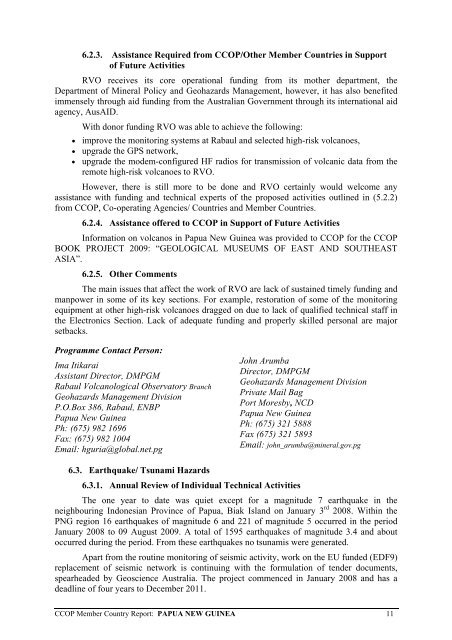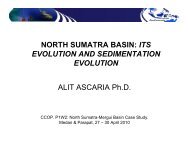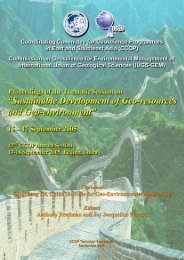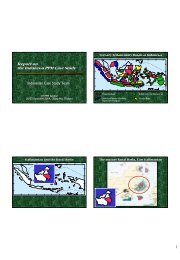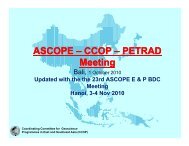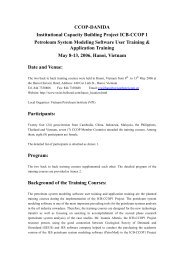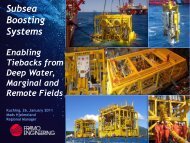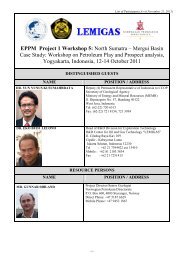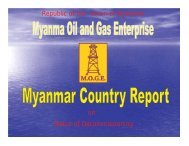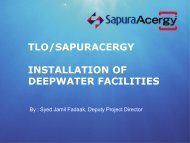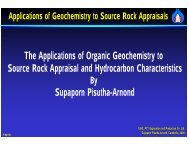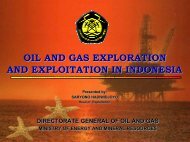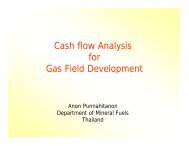Member Country Report of Papua New Guinea - CCOP
Member Country Report of Papua New Guinea - CCOP
Member Country Report of Papua New Guinea - CCOP
Create successful ePaper yourself
Turn your PDF publications into a flip-book with our unique Google optimized e-Paper software.
6.2.3. Assistance Required from <strong>CCOP</strong>/Other <strong>Member</strong> Countries in Support<strong>of</strong> Future ActivitiesRVO receives its core operational funding from its mother department, theDepartment <strong>of</strong> Mineral Policy and Geohazards Management, however, it has also benefitedimmensely through aid funding from the Australian Government through its international aidagency, AusAID.With donor funding RVO was able to achieve the following:• improve the monitoring systems at Rabaul and selected high-risk volcanoes,• upgrade the GPS network,• upgrade the modem-configured HF radios for transmission <strong>of</strong> volcanic data from theremote high-risk volcanoes to RVO.However, there is still more to be done and RVO certainly would welcome anyassistance with funding and technical experts <strong>of</strong> the proposed activities outlined in (5.2.2)from <strong>CCOP</strong>, Co-operating Agencies/ Countries and <strong>Member</strong> Countries.6.2.4. Assistance <strong>of</strong>fered to <strong>CCOP</strong> in Support <strong>of</strong> Future ActivitiesInformation on volcanos in <strong>Papua</strong> <strong>New</strong> <strong>Guinea</strong> was provided to <strong>CCOP</strong> for the <strong>CCOP</strong>BOOK PROJECT 2009: “GEOLOGICAL MUSEUMS OF EAST AND SOUTHEASTASIA”.6.2.5. Other CommentsThe main issues that affect the work <strong>of</strong> RVO are lack <strong>of</strong> sustained timely funding andmanpower in some <strong>of</strong> its key sections. For example, restoration <strong>of</strong> some <strong>of</strong> the monitoringequipment at other high-risk volcanoes dragged on due to lack <strong>of</strong> qualified technical staff inthe Electronics Section. Lack <strong>of</strong> adequate funding and properly skilled personal are majorsetbacks.Programme Contact Person:Ima ItikaraiAssistant Director, DMPGMRabaul Volcanological Observatory BranchGeohazards Management DivisionP.O.Box 386, Rabaul, ENBP<strong>Papua</strong> <strong>New</strong> <strong>Guinea</strong>Ph: (675) 982 1696Fax: (675) 982 1004Email: hguria@global.net.pgJohn ArumbaDirector, DMPGMGeohazards Management DivisionPrivate Mail BagPort Moresby, NCD<strong>Papua</strong> <strong>New</strong> <strong>Guinea</strong>Ph: (675) 321 5888Fax (675) 321 5893Email: john_arumba@mineral.gov.pg6.3. Earthquake/ Tsunami Hazards6.3.1. Annual Review <strong>of</strong> Individual Technical ActivitiesThe one year to date was quiet except for a magnitude 7 earthquake in theneighbouring Indonesian Province <strong>of</strong> <strong>Papua</strong>, Biak Island on January 3 rd 2008. Within thePNG region 16 earthquakes <strong>of</strong> magnitude 6 and 221 <strong>of</strong> magnitude 5 occurred in the periodJanuary 2008 to 09 August 2009. A total <strong>of</strong> 1595 earthquakes <strong>of</strong> magnitude 3.4 and aboutoccurred during the period. From these earthquakes no tsunamis were generated.Apart from the routine monitoring <strong>of</strong> seismic activity, work on the EU funded (EDF9)replacement <strong>of</strong> seismic network is continuing with the formulation <strong>of</strong> tender documents,spearheaded by Geoscience Australia. The project commenced in January 2008 and has adeadline <strong>of</strong> four years to December 2011.<strong>CCOP</strong> <strong>Member</strong> <strong>Country</strong> <strong>Report</strong>: PAPUA NEW GUINEA 11


